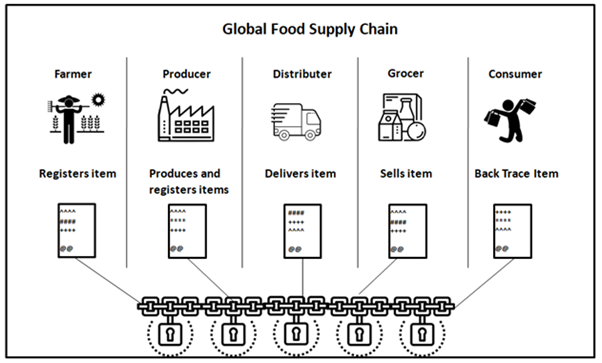NOVEMBER 4, 2020
Recent Blog
NOVEMBER 26, 2020
NOVEMBER 4, 2020
APRIL 16, 2020

In this two-part series, we will discuss two applications of blockchain in
- Agriculture
- Fishing
What is Blockchain?
In the simplest word Blockchain is a series of immutable records of data where each of these blocks of data is secured and contains a cryptographic hash of the previous block. The technology follows a decentralized approach; everyone involved has to follow the set of rules.
In a supply chain, there are multiple parties involved ( for e.g. in farming: a farmer, a distributor, a retailer and a consumer, etc.) with access to a shared set of data, about a common product that moves between them across its lifecycle. For making the supply chain process successful, every party that’s concerned with the product must show their involvement such as a farmer sharing the information about the product’s harvest, the distributor about the logistics, and the retailer about the price and consumer information.
Blockchain can be public, permission, or private depending on the permissions of the network. The World Economic Forum had earlier issued a report (Building Block(chain)s for a better Planet) which has identified several Blockchain use cases with the intention to mend a few of the world’s global environmental challenges.
Why is Blockchain important: Blockchain Technology is helping every industry in various ways; one of them is agriculture which we would cover in this article.
Before we discuss the agriculture use-case, it’s imperative to understand some of the benefits that blockchain technology can bring to businesses:
Blockchain facilitates trust through transparency and automated smart contracts while maintaining privacy and security across the supply chain. Some of the benefits have been cited below: –
- Traceability: -Indestructible record of transactions throughout the supply chain ensuring the integrity of the information.
- Transparency: — Real-time information to relevant participants eliminates disputes and dada silos allowing for faster response time.
- Security: — Permanent and immutable record of transactions provides a single source of data integrity.
- Automation: — Smart contracts help reduce paperwork, error rates, and intermediaries through automation.
- Auditability: — Transparent record of all digital interaction facilitates easy authentication and expedited audits.
Application of Blockchain in Agriculture :
As a farmer, keeping track of important data or storing the crop information in a piece of paper or spreadsheet isn’t relatively practical, and here’s where Blockchain will help them by tracking every record of a crop from the moment it’s planted till it reaches its consumers. All information about the supply chain processes and events can be securely stored and accessible in real-time thus providing insights to all the actors in making the process efficient.

Figure 1.0 — Overview of actors using the blockchain supply chain A major trend in food at a global level is the curiosity in consumers wanting to be familiar about where the food has come from or where it was produced and the labor and quality conditions etc. As mentioned earlier, Blockchain stores the data at every step in an immutable way which provides transparency and trust to the consumers about the food that they consume.
As food frauds are rapidly increasing (European Union Food Fraud Report) this is a problem that Blockchain technology can solve. A supply chain application offers its consumer a complete understanding of the food which has been purchased by them. If there is any unethical activity, then the time and location of such events could be identified and stored in an immutable way in Blockchain to provide end to end traceability and audibility (the decentralized architecture and consensus mechanism built into blockchain makes it almost impossible for one actor in the supply chain to manipulate data).
To ensure food safety from farm to fork, The European Union has implemented the Trade Control and Expert System for food traceability and risk management functions, which traces the food products through the supply chain process. Blockchain-based solutions increase efficiency and traceability across the production chain and transform the technique of how we connect, execute, and perform the business.
There is a wide acceptance in the government and private sector of the above-mentioned application of blockchain in the agriculture sectors (TNO & Wageningen University report). At Devopsinternational, we have developed a product called “ ProdTrack” which addresses this problem using Blockchain technology. Some of the core features of “ProdTrack” includes :
- Product Registration
- Capturing data received through Satellite systems
- Data entered by the actors
- Traceability of events across the supply chain
- Security and trust through encryption and consensus mechanisms
- Smart contracts for business logic automation
- Auditability with the help of certifying authorities
If you would like to know more, please visit our website (https://devopsinternational.nl/prodtrack/) or email us @ info@devopsinternational.nl